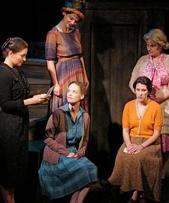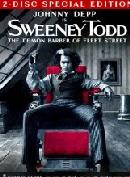HOME PAGE
SITE GUIDE
SEARCH
ADVERTISING AT CURTAINUP
REVIEWS
FEATURES
NEWS
Etcetera and
Short Term Listings
LISTINGS
Broadway
Off-Broadway
NYC Restaurants
BOOKS and CDs
OTHER PLACES
Berkshires
London
California
New Jersey
Philadelphia
Elsewhere
QUOTES
TKTS
PLAYWRIGHTS' ALBUMS
LETTERS TO EDITOR
FILM
LINKS
MISCELLANEOUS
Free Updates
Masthead
Writing for Us
A CurtainUp Los Angeles Review
The Friendly Hour
| I brought Gwynneth home. I prayed some more. And a miracle occurred. God changed me. — Dorcas, after her daughter Gwynneth, a lesbian whose sexuality her mother deplores, is attacked in Los Angeles and beaten into idiocy. |

From top, clockwise: Deana Barone, Bettina Zacar, Kate Mines, Ann Noble, Mara Marini
|
This new play is as close to conventional as Jacobson has come and even this one ranges from 1934 to 2007. The Friendly Hour is a social club formed by five farm women who went to high school together and have stayed in South Dakota ever since. They're inspired by Jacobson's mother and a diary he found recounting the minutes of the club. The women are feisty Dorcas (Ann Noble), strong opinionated Effie (Kate Mines), extroverted businesswoman Opal (Deana Barone), scarred Wava (Mara Marini) and an assortment of other club members and characters, all played by the versatile Bettina Zacar.
Depicting the life, mores and friendships of America's heartland, this is a valid portrait made viable by an excellent cast. The downside of this chronicle is the absence of conflict. The women have spats and sometimes old resentments last for years. Jacobson has the most fun with Effie who, despite being the only one who went to college where she majored in dramatics, is the most politically and religiously narrow-minded of the lot. She also tends to hide in the closet when upset.
Not much is said about their families, except a passing reference to Opal's philandering husband Porter and Dorcas's daughter Gwynneth who, after finally outing herself as a lesbian to her shocked parents, gets a Ph D, becomes an ornithologist at the Los Angeles Museum of Natural History and is the victim of an attack which leaves her partner dead and her mind gone. Dorcas spends her widowhood caring for her only child.
Director Mark Bringelson's familiarity with Jacobson's humor and rhythms bring the play to life. Pillars of natural wood surround Desma Murphy's set expressing rural life with all its natural beauty and inner rigidities, mellowed by Derrick McDaniel's lighting design. Lisa D. Burke designed quick change period costumes which serve beautifully to ground the play in the appropriate decade. Jacobson performs a service with something that isn't quite a drama or a memory play but whose characters make the trivia of their lives absorbing.
|
The Friendly Hour Playwright: Tom Jacobson Director: Mark Bringelson Cast: Deana Barone (Opal), Mara Marini (Wava), Kate Mines (Effie), Ann Noble (Dorcas), Bettina Zacar (Isabelle and others) Set Design: Desma Murphy Lighting Design: Derrick McDaniel Costume Design: Lisa D. Burke Sound Design & Original Music: Christopher Moscatiello Running Time: Two hours, one intermission Running Dates: September 12-November 1, 2008 Where: The Road Theatre Company, 5108 Lankershim Blvd, North Hollywood, CA, Reservations: (866) 811-4111 Reviewed by Laura Hitchcock on September 13, 2008. |
|







